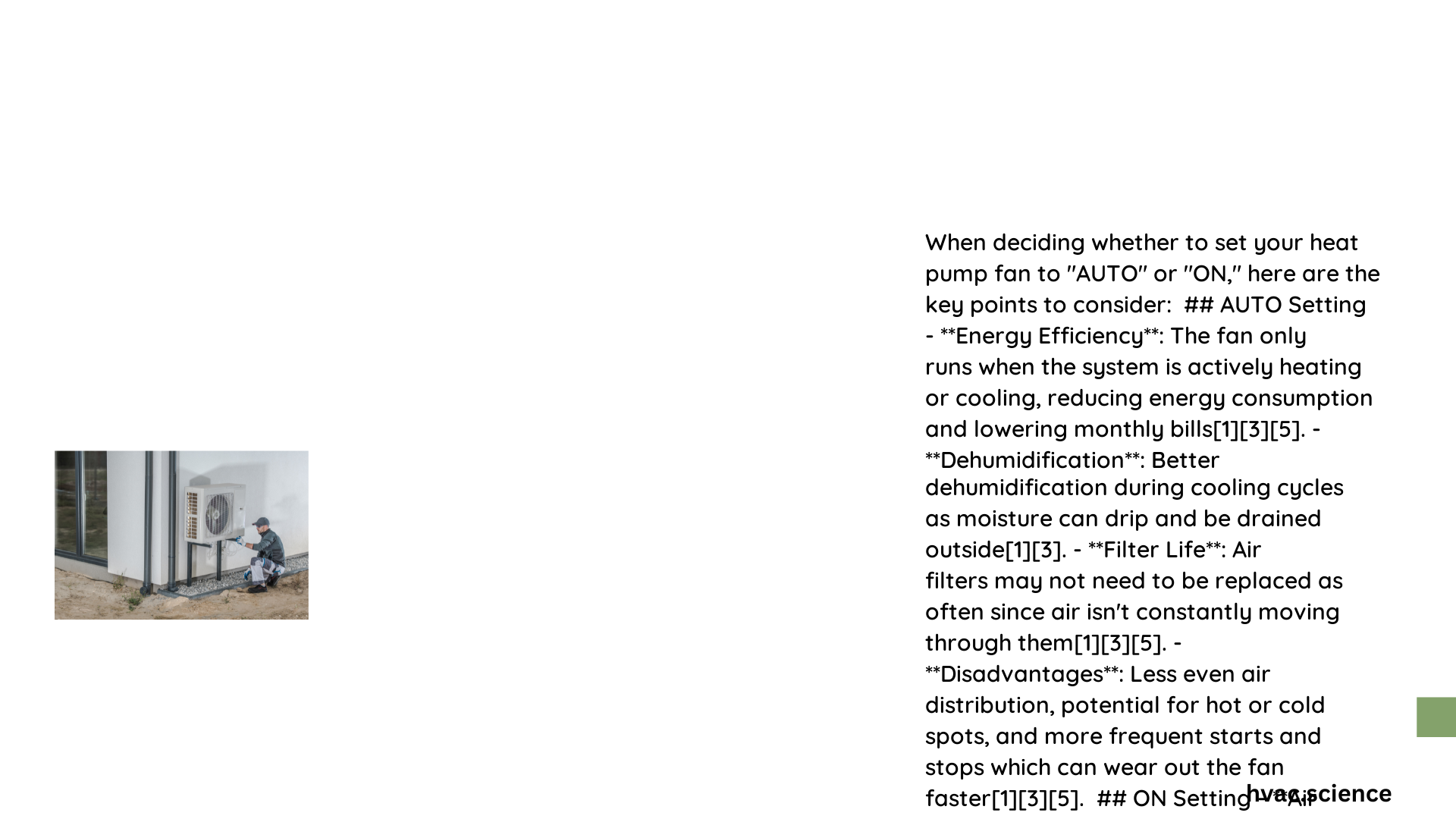Heat pump fan settings can significantly impact energy consumption, indoor comfort, and system performance. Understanding whether to set your heat pump fan to AUTO or ON requires careful consideration of factors like climate, energy efficiency, air quality, and system design. This comprehensive guide explores the nuanced decision-making process for heat pump fan operation, providing data-driven insights to help homeowners make informed choices about their HVAC system’s fan settings.
What Are the Energy Consumption Differences?
How Much Energy Can You Save with AUTO Mode?
The AUTO fan setting typically offers substantial energy savings compared to continuous operation. Consider these key data points:
| Setting | Annual Energy Consumption | Estimated Cost Savings |
|---|---|---|
| AUTO | 10,000 kWh | $300-$500 |
| ON | 14,000-15,000 kWh | Base Cost |
Key Energy Efficiency Insights:
- AUTO mode reduces fan runtime by approximately 40-60%
- Continuous fan operation can increase electricity costs by 30-50%
- Intermittent fan cycling minimizes unnecessary energy consumption
Why Does Fan Mode Matter for Heat Pumps?
Heat pumps operate differently from traditional HVAC systems, making fan settings crucial for:
– Optimal temperature distribution
– Energy efficiency
– Indoor air quality management
– System longevity
When Should You Choose AUTO Fan Mode?

What Are the Ideal Scenarios for AUTO Setting?
- Climate Considerations
- Humid regions requiring dehumidification
- Areas with moderate temperature fluctuations
-
Homes seeking maximum energy conservation
-
System Performance Benefits
- Reduced mechanical wear
- Lower electricity consumption
- Minimized unnecessary fan operation
How Does AUTO Mode Impact Indoor Comfort?
While AUTO mode might seem less consistent, modern heat pumps compensate through:
– Advanced temperature sensing
– Precise fan speed modulation
– Intelligent cycling mechanisms
What Are the Potential Drawbacks of Continuous Fan Operation?
Can Continuous Fan Mode Cause System Issues?
Potential challenges include:
– Increased mechanical stress
– Higher filter replacement frequency
– Elevated electricity expenses
– Potential motor degradation
Practical Recommendations for Heat Pump Fan Settings
How to Optimize Your Heat Pump Performance?
- Climate-Specific Strategies
- Humid Regions: Use AUTO with occasional “Dry” mode
-
Dry Climates: Lower fan speeds, minimal continuous operation
-
Energy-Saving Techniques
- Implement programmable thermostat settings
- Monitor energy consumption
- Regular system maintenance
What Maintenance Practices Support Efficient Operation?
- Annual professional HVAC inspection
- Regular filter replacement
- Clean air circulation paths
- Monitor system performance metrics
Advanced Considerations for Heat Pump Fan Management
How Can Smart Technology Enhance Fan Control?
Modern solutions include:
– Smart thermostats with learning algorithms
– Zoned temperature management
– Real-time energy consumption tracking
Conclusion: Making an Informed Decision
The decision between AUTO and ON fan modes depends on multiple factors. While AUTO generally provides superior energy efficiency, individual home characteristics matter significantly.
Recommended Action Steps:
– Assess your specific climate
– Evaluate home insulation
– Consult HVAC professional
– Monitor system performance
Reference:
1. Rhoads Energy – HVAC Fan Settings
2. Energy Efficiency Guide
3. HVAC Performance Insights
